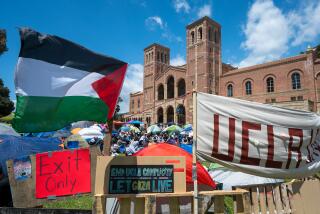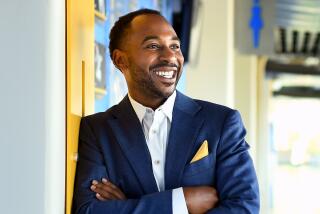Elijah Wade left UCLA football. Now he aims to protect Bruins athletes in COVID-19 era
The NCAA and its conferences have left it to each school to decide when it is safe for athletes to return to campus during the COVID-19 pandemic. And that has Elijah Wade worried.
Wade, a defensive end out of Las Vegas who signed with UCLA as part of Chip Kelly’s first recruiting haul in 2018, left the program this spring. He told The Times he medically retired from football because of an in-season injury that he felt was mishandled by UCLA staff, leading to physical and emotional trauma.
When former teammates told Wade that they had practiced four times and were dressed in full pads on March 12 for a fifth before that practice was canceled, “I began to panic,” Wade said. “I’m hearing about this pandemic ravaging different states and becoming an issue around the world and … I feared for their safety.”
By then, Wade was already doing something about it. His football career had ended midway through his sophomore year, but he now had a bigger mission for his time in Westwood. He decided to run for a seat on the Undergraduate Student Association Council (USAC), gathering more than 100 signatures to get on the ballot, then navigating a virtual election process to be elected as a general representative.
The Pac-12 Conference voted Tuesday to allow voluntary, on-campus workouts for all athletes beginning as soon as June 15.
Tuesday night, hours after the Pac-12 announced that it would allow athletes to return to campus for voluntary workouts starting June 15, Wade was at a USAC meeting pushing a resolution he authored that aims to protect UCLA athletes from harm during a restart of college sports.
The student council voted to unanimously pass the resolution, which calls for:
- “Student-athletes to have positions on all task forces or internal discussions related to return to practice and competition.”
- “UCLA to ensure that student-athletes are completely informed about COVID-19 health risks associated with their health, the health of their families, and the health of their communities so that they can make informed decisions.”
- “Student-athletes to have a choice in deciding whether they return to college sports activities during the COVID-19 pandemic without the fear of the reduction and/or cancellation of their scholarship, threats or retaliation of any kind.”
- “Public health officials to identify and enforce health and safety standards related to COVID-19, and the prevention of serious injury, abuse and death as a condition for resuming college sports activity. [Enforcement] should be funded by the university and include mandatory reporting of suspected violations witnessed by athletic personnel, whistleblower protections for those reporting a suspected violation; and the ability to retrain, suspend or ban athletic personnel who violate such standards.”
- “California Gov. Gavin Newsom, the Los Angeles County Board of Supervisors, the Los Angeles City Council, the UC Regents, UCLA Chancellor Gene Block, and UCLA Athletic Director Martin Jarmond to immediately adopt the safeguards detailed in this resolution through their respective public health orders or university powers.”
The UC system has not cleared non-athlete students to return to campus. A “stay-at-home” order for L.A. County is expected to last well into the summer.
A UCLA athletic department spokesperson released a statement in response to Wade’s resolution, saying: “UCLA Athletics is working closely with campus leadership to determine how and when student-athletes — and the larger campus community — can return safely. The timeline and protocol that are ultimately determined will be based on the guidelines of public health agencies.”
The statement said that the “Bruin Athletic Council,” which includes athlete representatives from all 25 sports as well as leaders from other athlete groups, would be consulted on return-to-training models.
In preparing his resolution, Wade said he spoke with athletes from various UCLA sports and others from around the country. He said football players found the idea of “voluntary” workouts comical, since attendance is kept at each one and those who don’t attend are labeled as “lazy and not committed.” He said the athletes did not want their identities revealed because of potential retribution.
Without safeguards like the ones listed in the resolution, Wade said, athletes would feel pressure to play even if they were uncomfortable.
International student-athletes at UCLA and USC have found that a global pandemic can bring about long waits to get home and days spent in isolation.
Wade shared two responses to a question of whether athletes who choose not to play should keep their scholarship:
“Yes because if not you’re essentially forcing student-athletes to return and risk their lives without compensation.”
“Absolutely. The scholarship was earned and shouldn’t be lost if someone prioritizes health over their coaches’ wants during the situation of a pandemic.”
Ramogi Huma, the executive director of the National College Players Assn., an advocacy group for college athletes, said athletes were counting on Newsom, local officials and UC leaders to make sure athletes were treated the same as other students.
“If any of them do the right thing,” Huma said, “players will be in a better position at UCLA and throughout the state.”
Huma pointed to what he said was a long history of athlete mistreatment at colleges that shows schools, hungry for the tens of millions of dollars in revenue that college football brings, are not capable of “self-policing” their own health and safety standards.
Wade’s personal disappointment at UCLA was the driving force in him joining student government. Tuesday’s passing vote was a positive first step in the second life of the former Bruin.
“It was a long journey to now,” Wade said, “feeling like a failure, neglected, disrespected, marginalized, silenced, a lot of words I could use.
“I felt that I had a voice, that I’m a person that was willing to take everything that came with this position and put myself in the crossfire, so that students could have someone that had their best interest at heart.”
More to Read
Go beyond the scoreboard
Get the latest on L.A.'s teams in the daily Sports Report newsletter.
You may occasionally receive promotional content from the Los Angeles Times.











